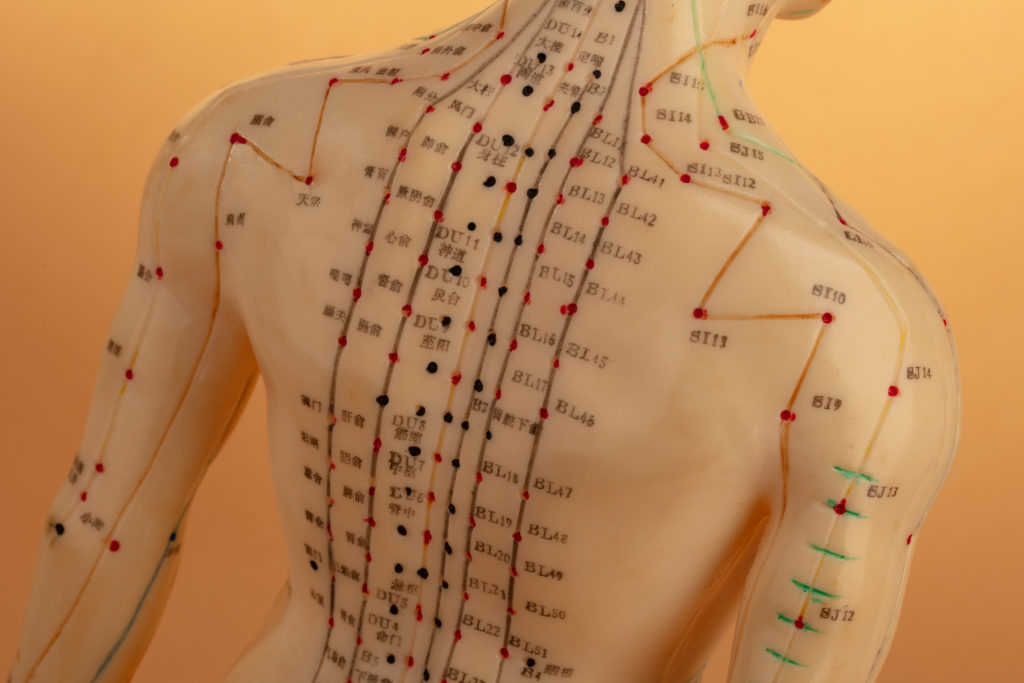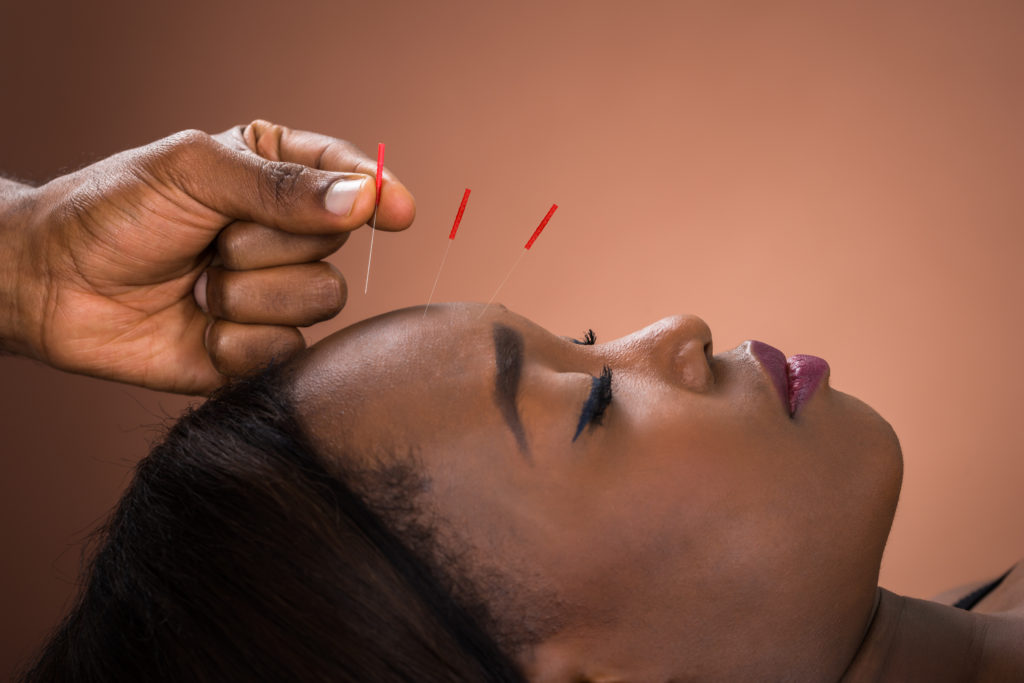How does acupuncture work? It may seem like a simple question, but there are actually many ways to answer it.
For this article, we’ll focus on its impact on the central nervous system and how that can support your mental health.
What is Acupuncture?
Acupuncture is an over 5,000-year-old medicine that originated in China. The medical practice is part of Traditional Chinese Medicine, and is used for a multitude of ailments. This ancient medicine consists of a transcutaneous intervention via a thin, sterile needle.
The introduction of this agent leads to various physiological changes because the body is a holistic unit. Therefore, when you act on one part of it, the entire body responds to it. Because of this, the external forces causing sensory information to be processed by the brain can lead to a cascade of changes.
These changes can be anything from hormonal to neurochemical, to visceral. It is through these systemic alterations that we can begin to treat any system holistically via acupuncture. But for the purpose of this article, we will discuss how these filiform needles, an agent of electrical conduction, tap into your neural wiring to harmonize mood imbalances.
Reviewing the literature that aims at dissecting the effects of acupuncture in mental health issues, we gain a better understanding of what benefits it has to offer us given the current global pandemic.

In May of 2020, the United Nations addressed the multi-level mental health impacts that the COVID-19 pandemic would bring upon our society. The ongoing stress of the pandemic has taken many tolls on people with the many losses we have all communally experienced: loss of loved ones, loss of housing, loss of financial stability, loss of bodily autonomy, loss over health freedoms.
Now more than ever, it is crucial that we turn to a medicine that offers systemic support and harmonization to mental health.
How Does Acupuncture Work On The Body?
Acupuncture has been found to have a mechanism of action through neuronal activity affecting neurotransmitter activity. When a needle is inserted, it initiates with an axon reflex in a neuronal network that stimulates the fast-acting, pain-sensing A-delta and muscle fibers.
The action potentials generated by the neurons at the time of needle insertion have been found to cause neurogenic inflammation that is NOT mediated by the immune system. Instead, it is mediated by the release of the most potent vasodilator, a neuropeptide named Calcitonin Gene-Related Peptide. CGRP dilates local capillaries to support the release of both inhibitory and stimulatory neuropeptides.
The neuropeptides that support the excitatory transmission of sensory information include cytokines, prostaglandins, bradykinin, and other pro-inflammatory markers.
The mediators that suppress the electrical excitation of the sensory perceiving fibers are acetylcholine, norepinephrine, gamma-aminobutyric acid (GABA), adenosine triphosphate (ATP), cyclic guanosine monophosphate, and adenosine (Filshie et.al. 2016)
There is also a release of serotonin (5-HT), but this is a far more complex mechanism dependent on what receptors this neurotransmitter binds to ( Zhang et.al., 2012).
Overall, acupuncture leads to higher local inhibitory neuropeptide release. This local chemical soup of sensory information then makes its way up to the brain for central nervous system processing and integration.
The Limbic System At Play
Once the local nervous system cascade signaling goes into play, the central nervous system initiates processing in the midbrain. The neuronal tissue then generates action potentials within varying brain structures. The cerebral cortex is where the needling sensation is registered.
But the areas of interest for our purposes are a few of the deeper structures of the limbic system. The primary function of the limbic system is to preserve the individual and species.
During stress (or perceived stress), the limbic system leads to the offensive or defensive emotional reactions of anger and fear and the increased heart and respiration rate.
The structures at play during needle insertion are the amygdala, hippocampus, prefrontal cortex, and hypothalamus. The amygdala is the fear and emotional center, which is modulated by the prefrontal cortex.
The hippocampus serves as the memory center. The hypothalamus controls the autonomic nervous system- visceral activities that we don’t consciously carry out; it is responsible for the physical manifestations of emotions such as sweating, pounding heart rate, and high blood pressure. The hypothalamus is essentially the cyclical control center as it also regulates the sleep-wake cycle, food intake, and endocrine function. (Moini et. al. 2020)
Neuroimaging Acupuncture Studies
Research studies investigating how acupuncture affects the brain have found both the amygdala and hypothalamus to have decreased activation during acupuncture stimulation. The meaning of deactivation of these two brain centers is assumed to support acupuncture’s ability to modulate anxiety and fear-based response. (Hui et.al. 2010)
One study aimed to measure the activity of the prefrontal cortex and the effects of acupuncture on anxiety found that acupuncture was effective in decreasing pressure.
The other significant finding was the measured oxygenation of hemoglobin in the bilateral prefrontal cortex – the acupuncture treatment was found to work as an adaptogen to achieve homeostasis in oxygenation of the prefrontal cortex. Although this was a pilot study, it shines some light on one of the possible mechanisms at play in acupuncture’s ability to reduce anxiety. (Sakatani et al 2016)
Other studies concluded that the down-regulation of the amygdala, hypothalamus and hippocampus (and limbic system as a whole) could be most supportive in treating mood imbalances via acupuncture. ( Hui et. al. 2010) A systematic review investigating the MRI studies of acupuncture on patients presenting with depression concluded a few significant findings. One was that acupuncture increased biomarkers evaluating the brain’s energy metabolism and the brain’s ability to regenerate neurons after injury.

Secondly, acupuncture increased neuronal activity in the right precuneus (part of the limbic system) with decreased activity in the prefrontal cortex. And lastly, acupuncture increased functional connections in the anterior cingulate cortex (also part of the limbic system) (Zhang et. al. 2021). All of these findings highlight the healing benefits of acupuncture on the brain in mood disorders.
What’s Next For The Study of Acupuncture?
Acupuncture continues to be a heavily researched focus area, as there is so much that remains unknown in terms of its mechanism of action. This exploration and breakdown of how it functions on the nervous system is simply one of the many vast ways it acts on physiology.
Given its big impact on the limbic system, it is a tool that can support anyone experiencing any level of emotional distress. It is always best to treat the emotional state as soon as it presents before deepening a neuronal groove. Once an emotional state has created a neuronal pattern, it may take a physical toll. Still, even at the onset, we can experience physical symptoms (palpitations, low energy, shortness of breath). But guess what- acupuncture works on all tissues!
Acupuncture’s ability to act on the limbic system is one of the key players in ensuring that an emotional state does not take on a physical manifestation. And even in those cases in which long-term mood imbalances have taken a physical manifestation, it can surely unravel the knots of the physical presentations and restore biological harmony. There is a mechanism at play with muscle tissue, another with visceral organ influence, one with the fascial system, and the list goes on and on. This allows for acupuncture to support a multitude of medical concerns and provide great benefits to virtually all medical conditions. Needless to say, the benefits of this ancient medicine are endless.
Acupuncture has begun to gain traction in recent years, but amidst the global pandemic, we are seeing people turning to holistic and natural medicine to support them. Unfortunately, the global pandemic has revealed the many shortcomings of allopathic medicine at a public health level: the deaths in co-morbidities, the failure to address low Vitamin D levels, the overall adolescent approach to recovery from a virus. As much of a challenge as this time has been for us all globally, it has also served as a great opportunity for growth- to seek a new way to support our health.
There is more inquiry than ever as to what acupuncture is and how it can help people better manage their stress, pain, and lifestyle. And with the scientific method currently providing research on the mechanisms at play and the benefits of acupuncture, surely acupuncture will continue to pave the way for the health of many. There is so much yet to be discovered in regard to the function of acupuncture and its effects on burnout, PTSD, anxiety, depression, bipolar disorder, mental breakdowns, schizophrenia, insomnia.
To be able to support the body with an intervention that does not tax it but rather harmonizes it to a place of adaptogenic homeostasis is what we all should strive for when it comes to healthcare.
It is a medicine, that although biomedical terms are lacking, continues to stand tall, and expand in numbers over the test of time. So now are you ready to add acupuncture to your wellness arsenal?
